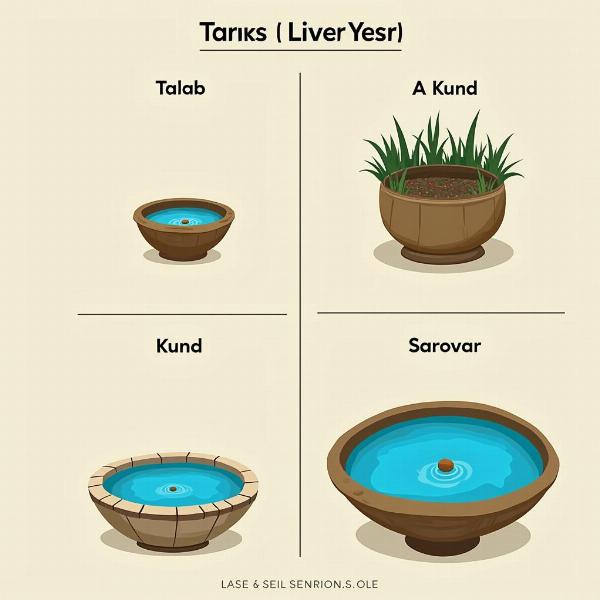Pokhar meaning in Hindi revolves around the concept of a pond, a small body of water. Understanding its various nuances, cultural significance, and linguistic connections provides a deeper appreciation for this simple yet evocative word. This exploration will delve into the different contexts in which “pokhar” is used, its synonyms, and its place in Indian literature and tradition.
Exploring the Depths of “Pokhar”
“Pokhar” (पोखर) is a commonly used word in Hindi, primarily referring to a pond, often smaller than a lake. It evokes images of serene village life, where the local pokhar serves as a vital resource for water, a gathering place for the community, and a source of inspiration for poets and artists. But its meaning goes beyond just a body of water. It’s intertwined with the cultural fabric of India, representing life, sustenance, and tranquility. What exactly comes to your mind when you hear the word “pokhar”? Do you picture a tranquil oasis amidst bustling village life, or perhaps a vibrant ecosystem teeming with life?
“Pokhar” in Different Contexts
The word “pokhar” can be used in various contexts, adding layers of meaning to its simple definition. It can refer to a natural pond formed by rainwater collection or a man-made reservoir used for irrigation or aquaculture. In some regions, it can also denote a small lake or even a water-filled ditch. This versatility highlights the word’s adaptability to different geographical and cultural settings. Imagine a farmer relying on the pokhar for irrigating his crops, or a group of children joyfully playing by its edge. These scenarios illustrate the multifaceted role of the pokhar in everyday Indian life.
Synonyms and Related Terms for “Pokhar”
Several Hindi words share similar meanings with “pokhar,” each offering a slightly different perspective on the concept of a small body of water. Words like “talab” (तालाब), “kund” (कुंड), and “sarovar” (सरोवर) often overlap with “pokhar” but can also denote larger bodies of water or those with specific religious significance. Understanding these subtle differences enriches our understanding of the Hindi language’s rich vocabulary related to water bodies. For example, “kund” often refers to a sacred pool used for ritual bathing, while “sarovar” can denote a large lake, often associated with mythological stories.
 Talab, Kund, and Sarovar
Talab, Kund, and Sarovar
“Pokhar” in Indian Literature and Tradition
“Pokhar” has found its place in countless poems, stories, and songs, reflecting its deep-rooted significance in Indian culture. It symbolizes life, purity, and tranquility, often serving as a backdrop for romantic encounters or philosophical reflections. From ancient scriptures to modern literature, the pokhar continues to inspire and captivate. Think of the serene image of a lotus blooming in a quiet pokhar, a recurring motif in Indian art and literature.
The Importance of Preserving “Pokhars”
In a rapidly urbanizing India, the traditional pokhar faces numerous threats, including pollution, encroachment, and neglect. Recognizing its ecological and cultural importance, efforts are being made to preserve and rejuvenate these vital water bodies. Protecting the pokhar is not just about conserving water; it’s about safeguarding a vital part of India’s heritage.
Conclusion: More Than Just Water
“Pokhar,” in its essence, is much more than just a word for a pond. It embodies a rich tapestry of cultural, ecological, and linguistic significance, deeply woven into the fabric of Indian life. From its practical use as a water source to its symbolic representation of life and tranquility, the “pokhar” holds a special place in the heart of India.
FAQ:
- What is the literal meaning of “pokhar” in Hindi? The literal meaning of “pokhar” is a pond, typically smaller than a lake.
- What are some synonyms for “pokhar”? Synonyms include “talab,” “kund,” and “sarovar,” each with slight variations in meaning.
- Why are “pokhars” important in Indian culture? They are vital water sources, community gathering places, and hold symbolic significance in literature and tradition.
- What are the threats to “pokhars” in modern India? Pollution, encroachment, and neglect pose significant threats.
- How can we contribute to the preservation of “pokhars”? Supporting conservation efforts, raising awareness, and responsible water usage are crucial steps.
- Is “pokhar” used in other Indian languages? Yes, variations of the word exist in several other Indian languages, often with similar meanings.
- What is the difference between a “pokhar” and a “talab”? While both refer to bodies of water, “talab” generally implies a larger and more formally constructed pond compared to a “pokhar”.
Related Articles:
About Meaning-Hindi.in
Meaning-Hindi.in is your premier destination for high-quality Hindi translation services. We specialize in a wide range of translation needs, including business and commercial documents, legal and certified translations, technical manuals, website localization, educational and academic materials, and express translation services. Our expert linguists are deeply versed in the nuances of Hindi grammar, literature, and cultural context, ensuring accurate and culturally sensitive translations. Need a document translated quickly and accurately? Contact us today at [email protected] or call us at +91 11-4502-7584. Meaning-Hindi.in is here to bridge the language gap and connect you to the world.